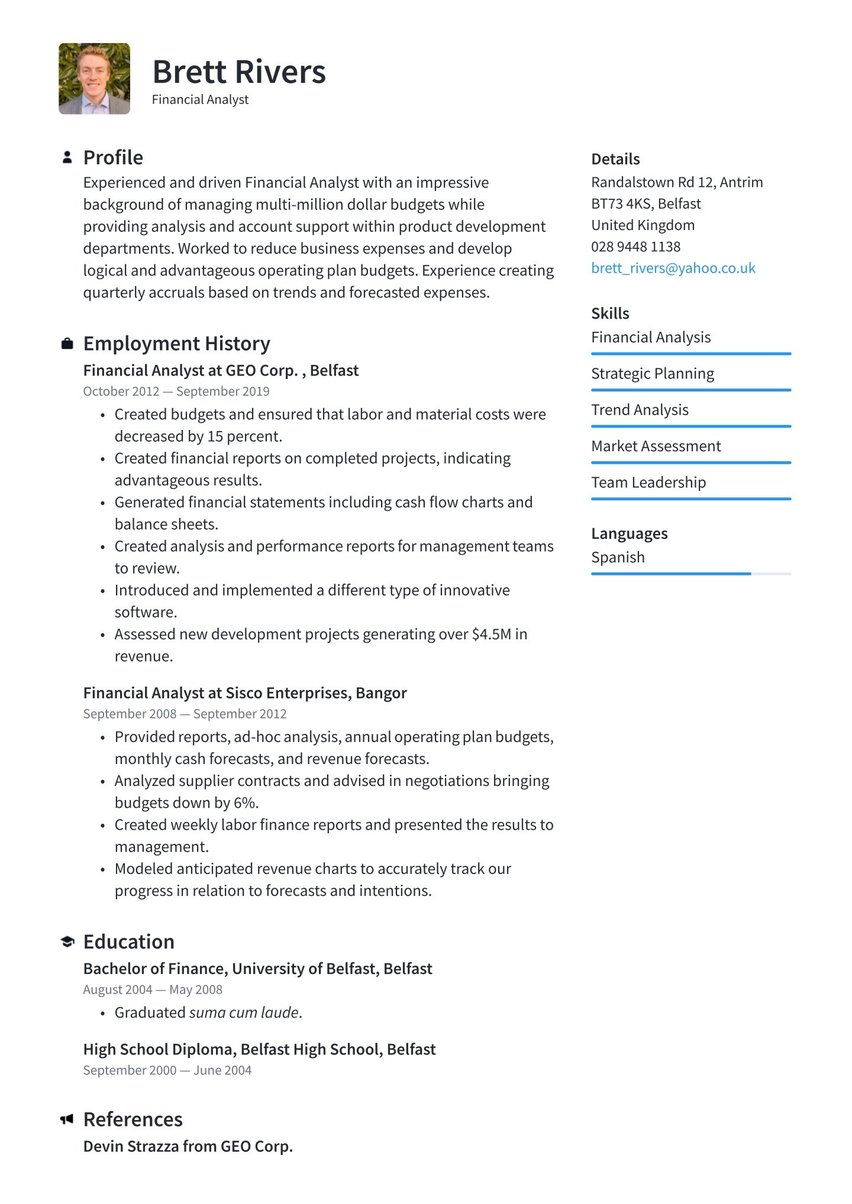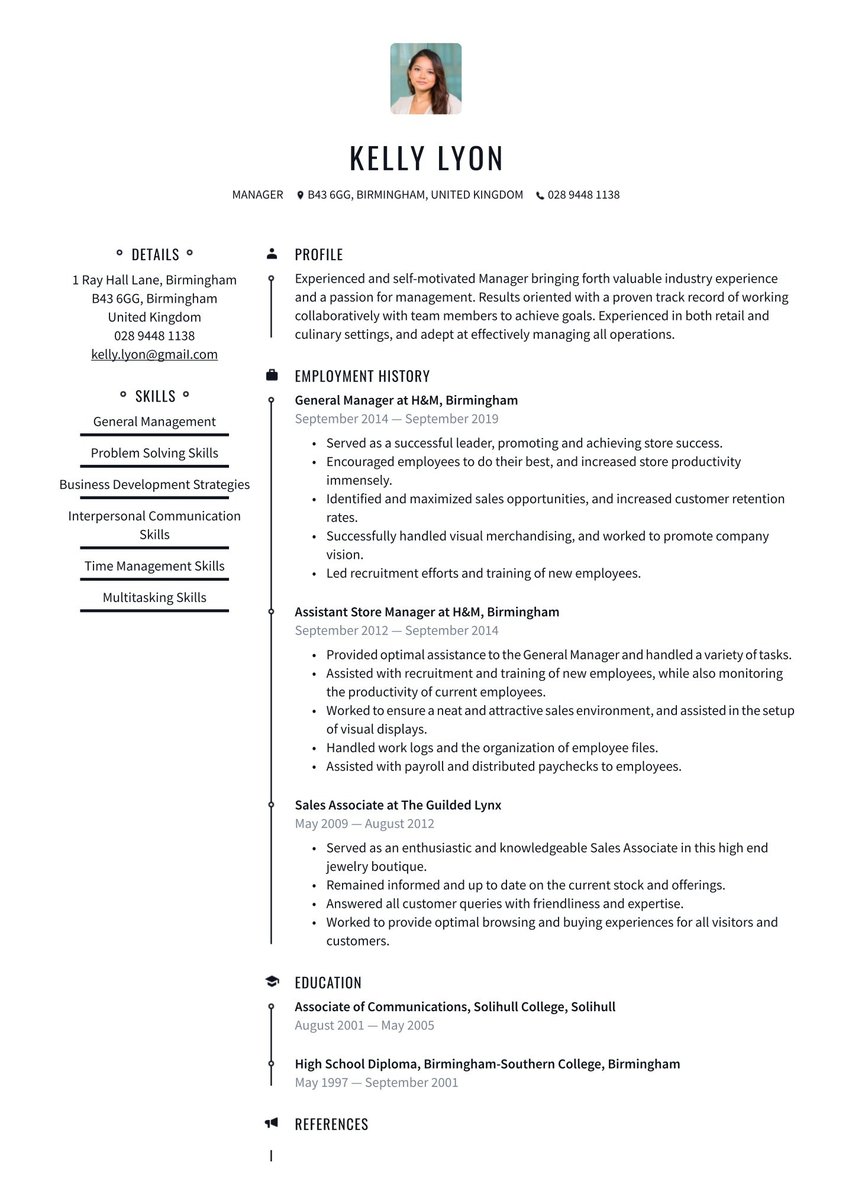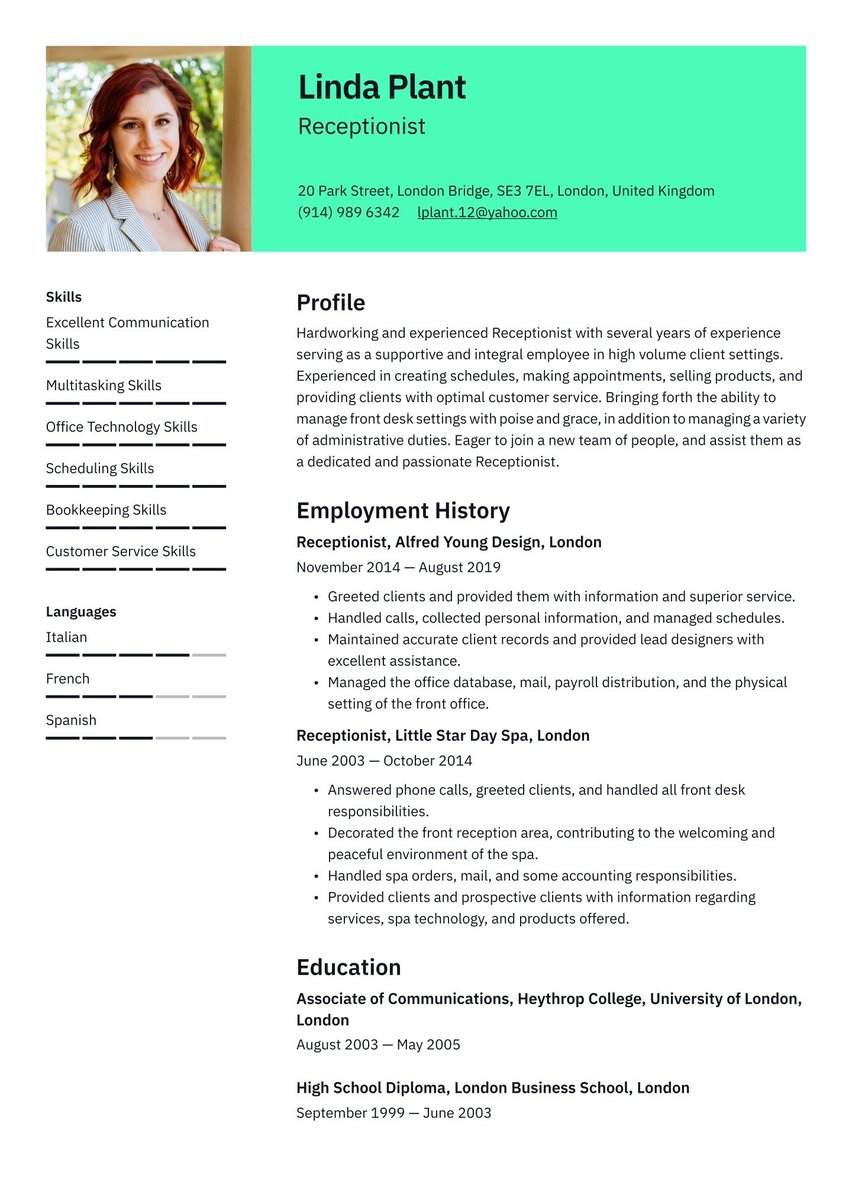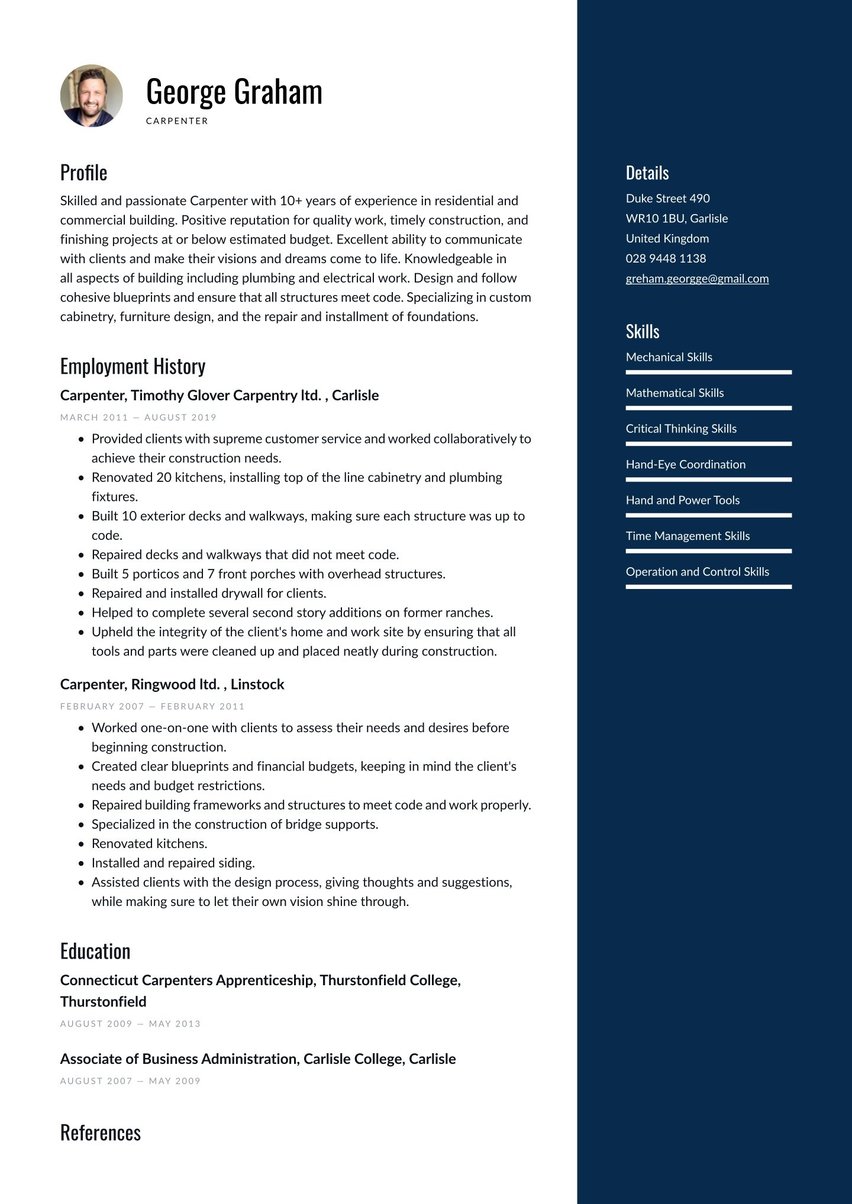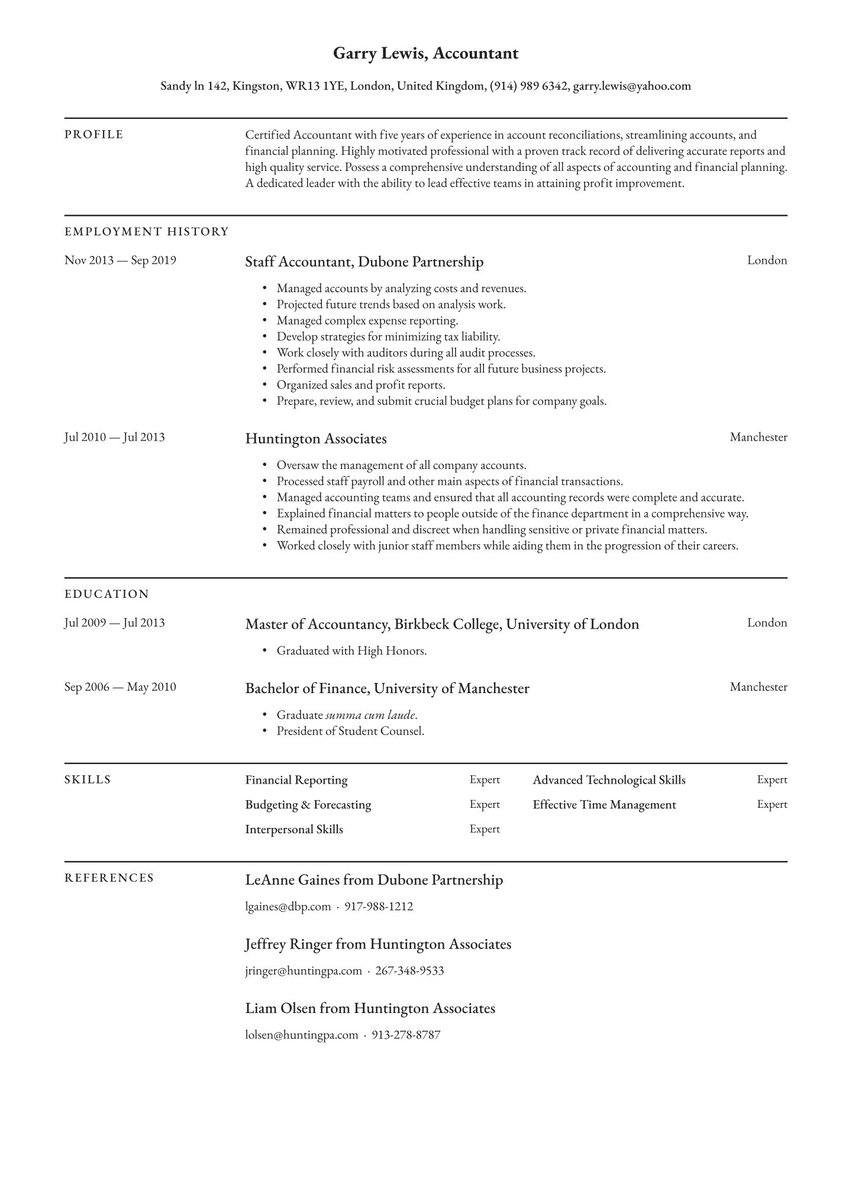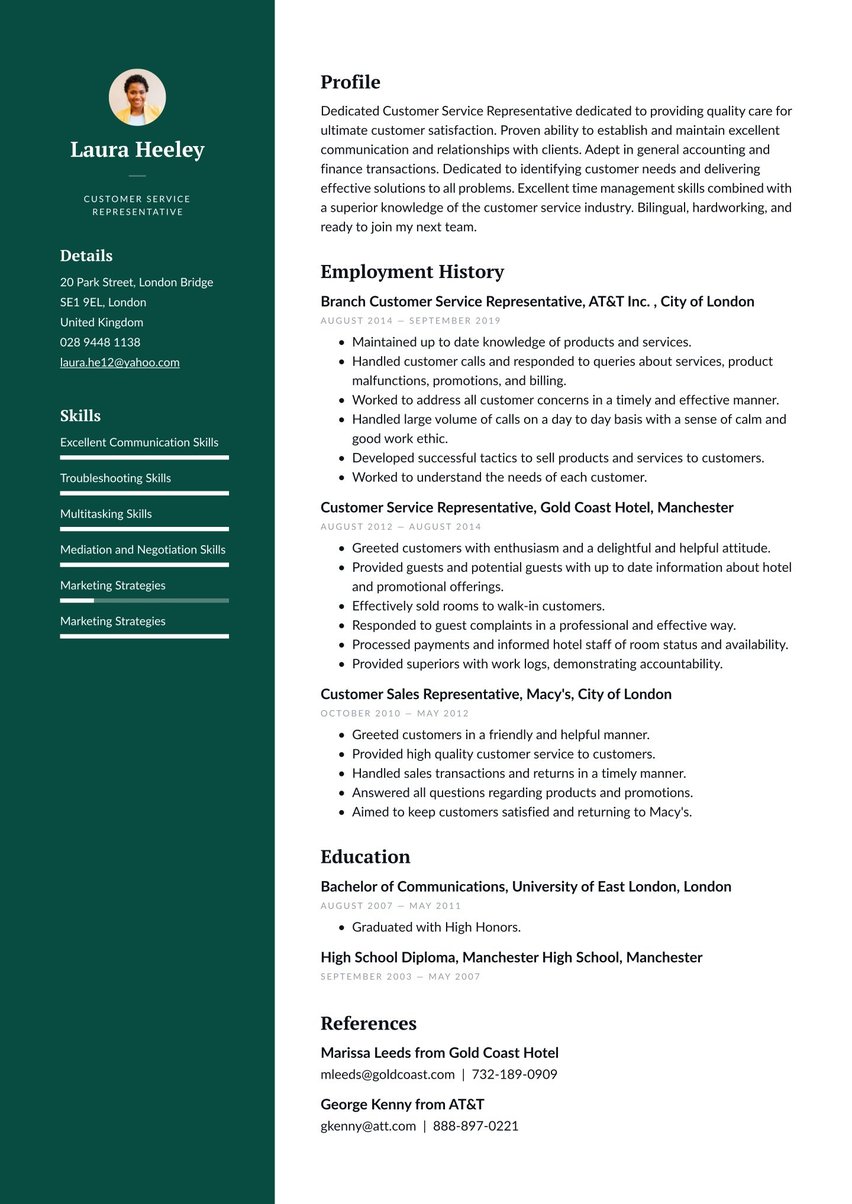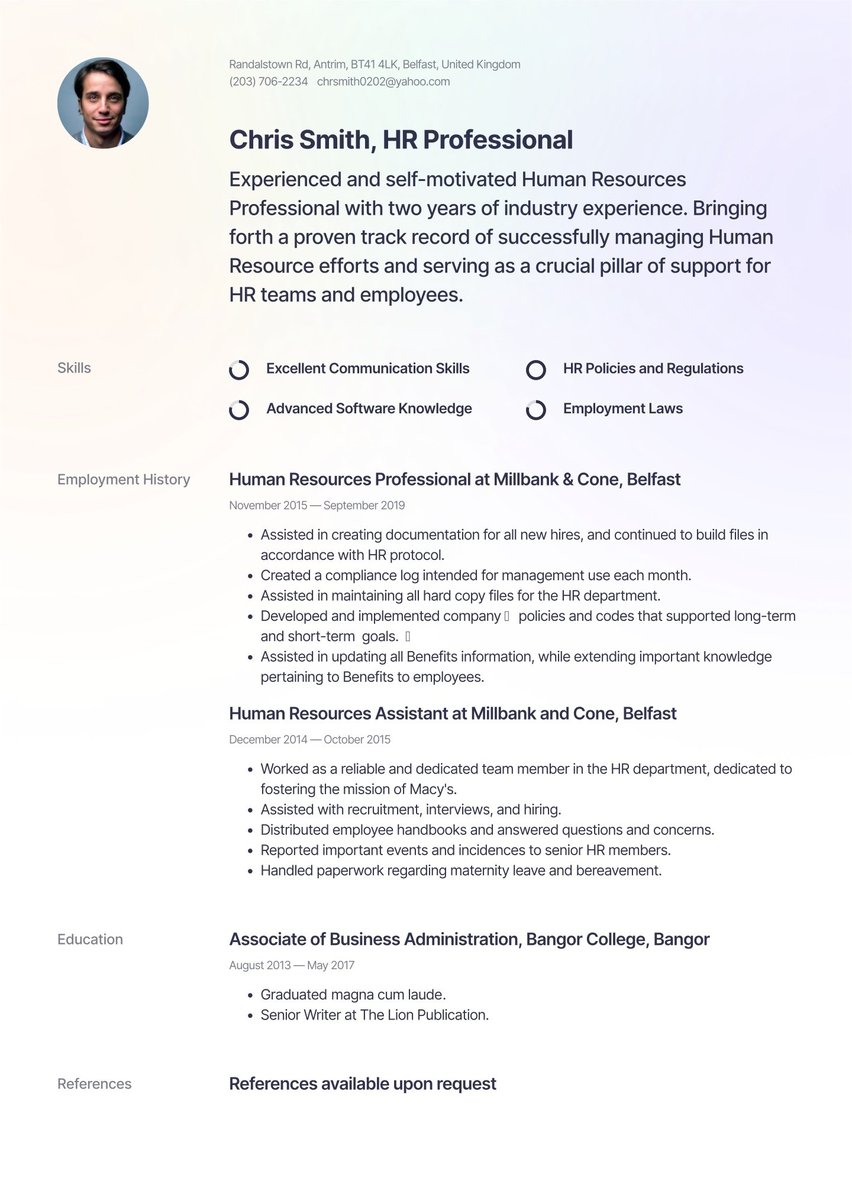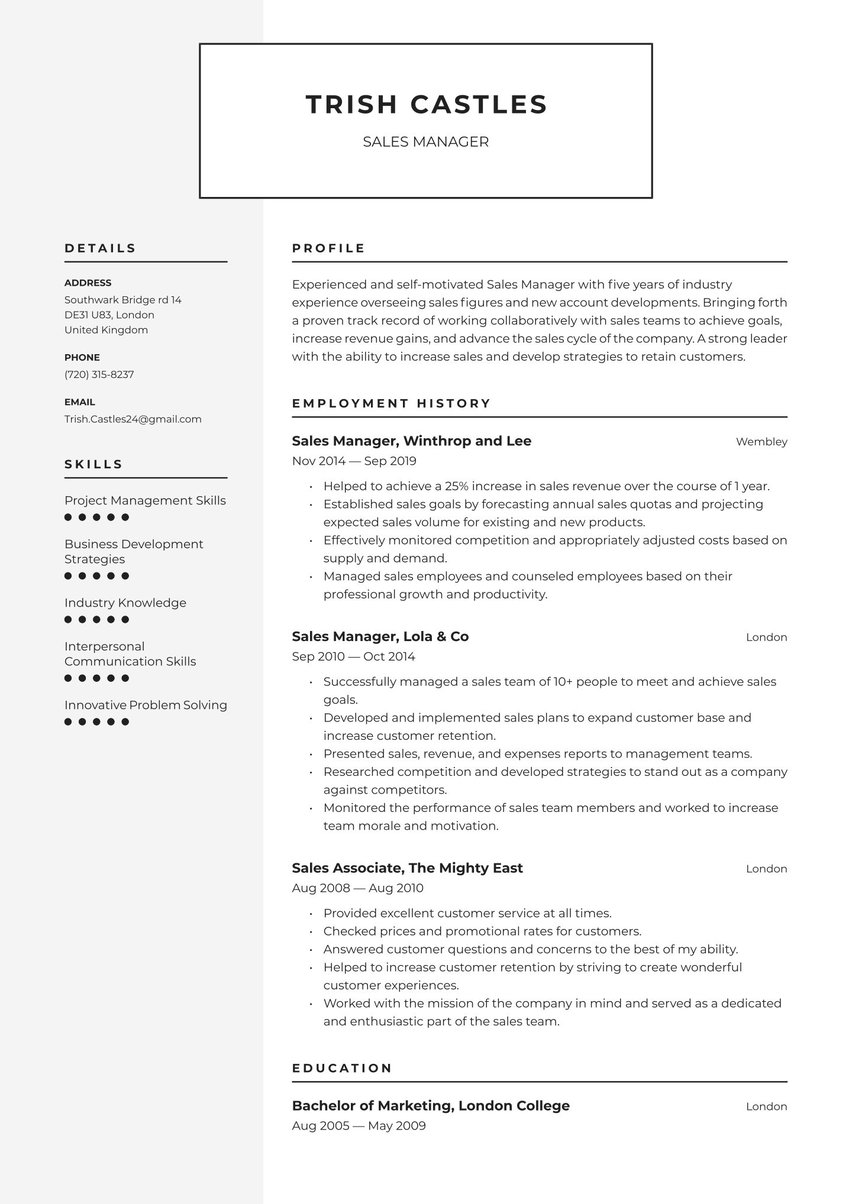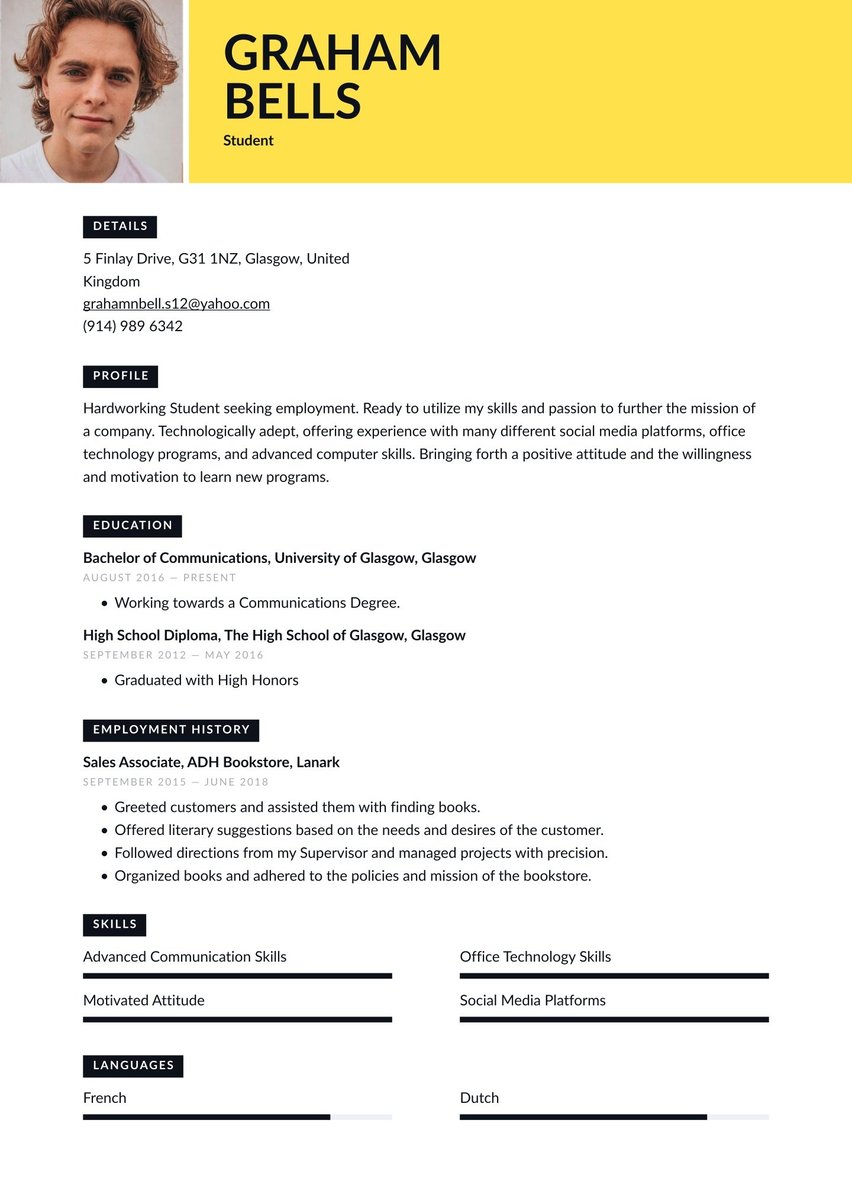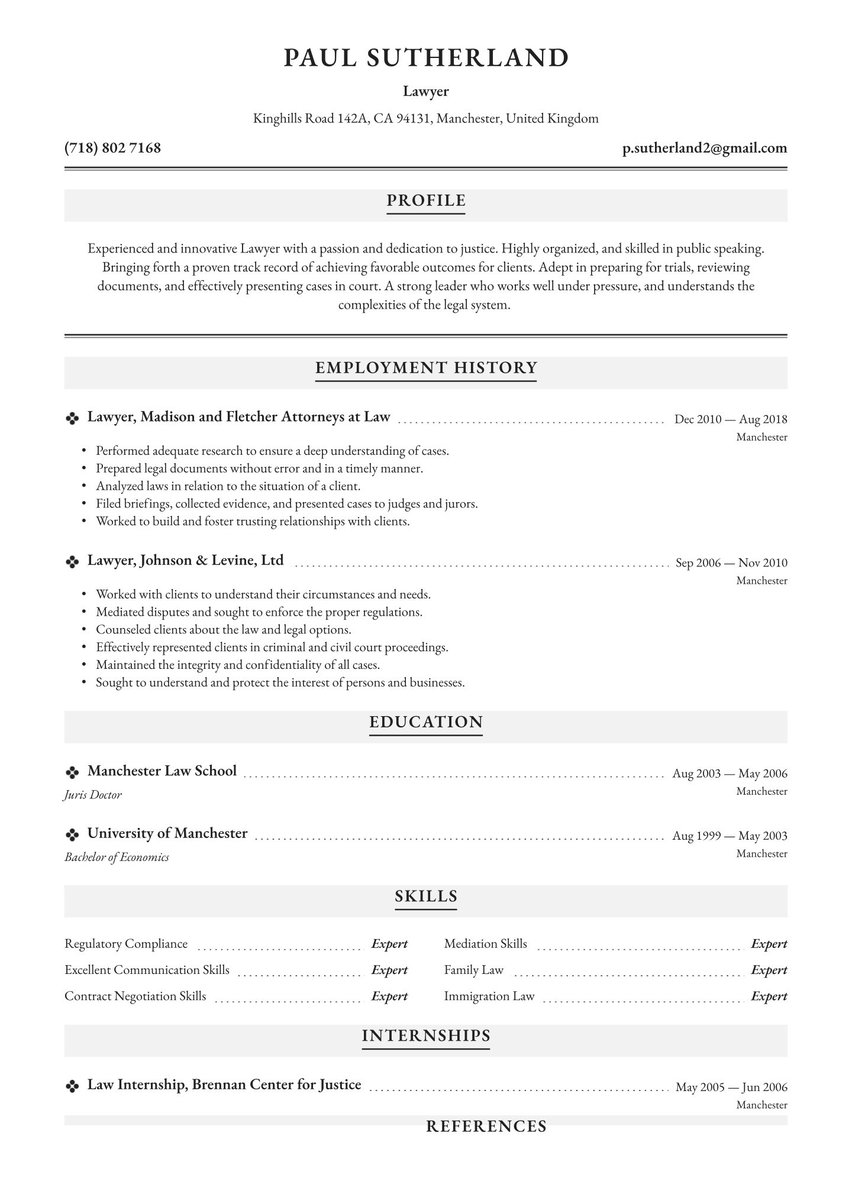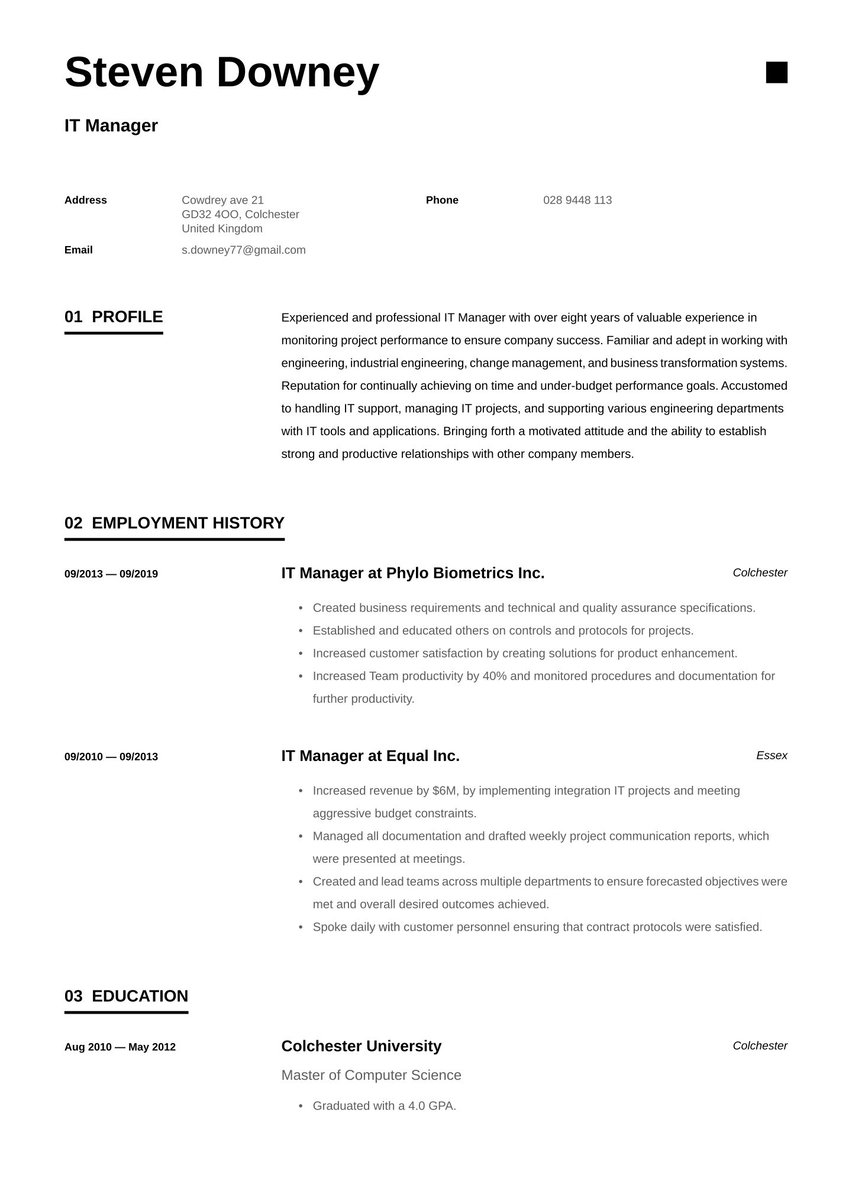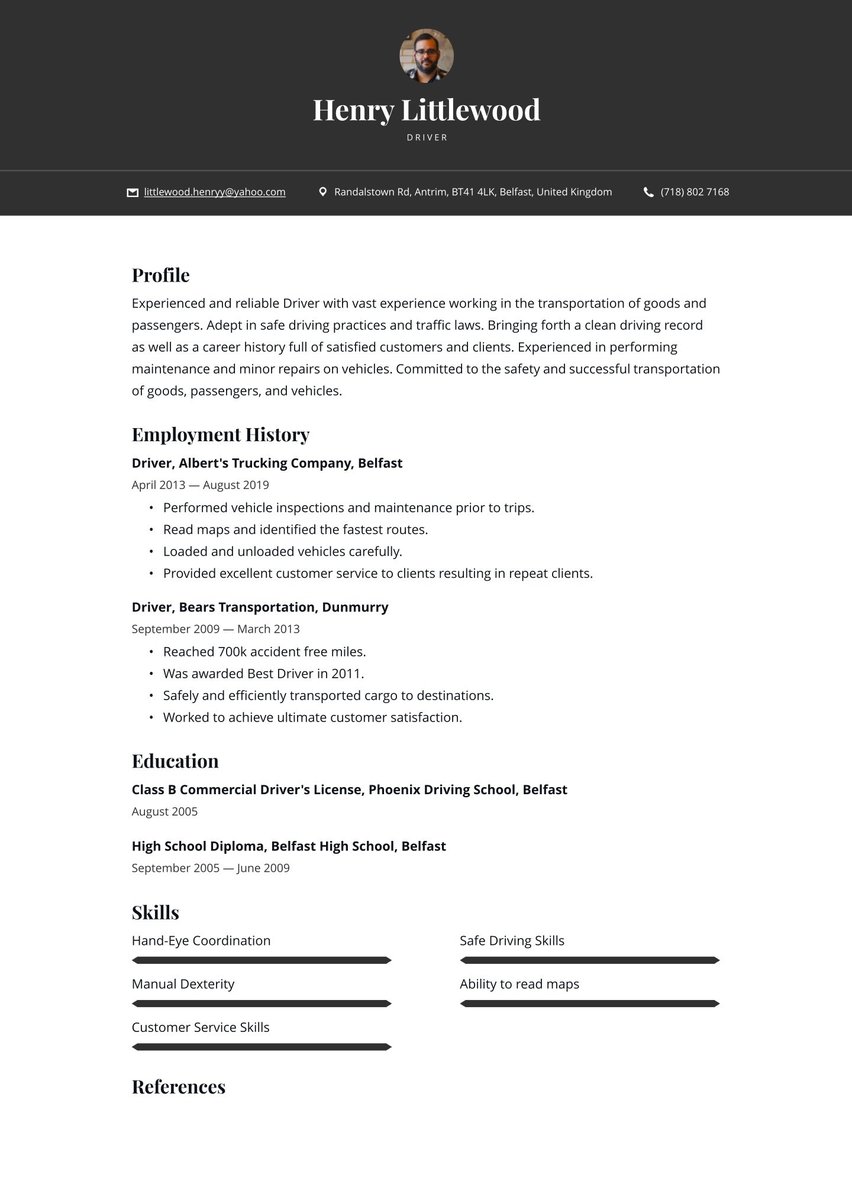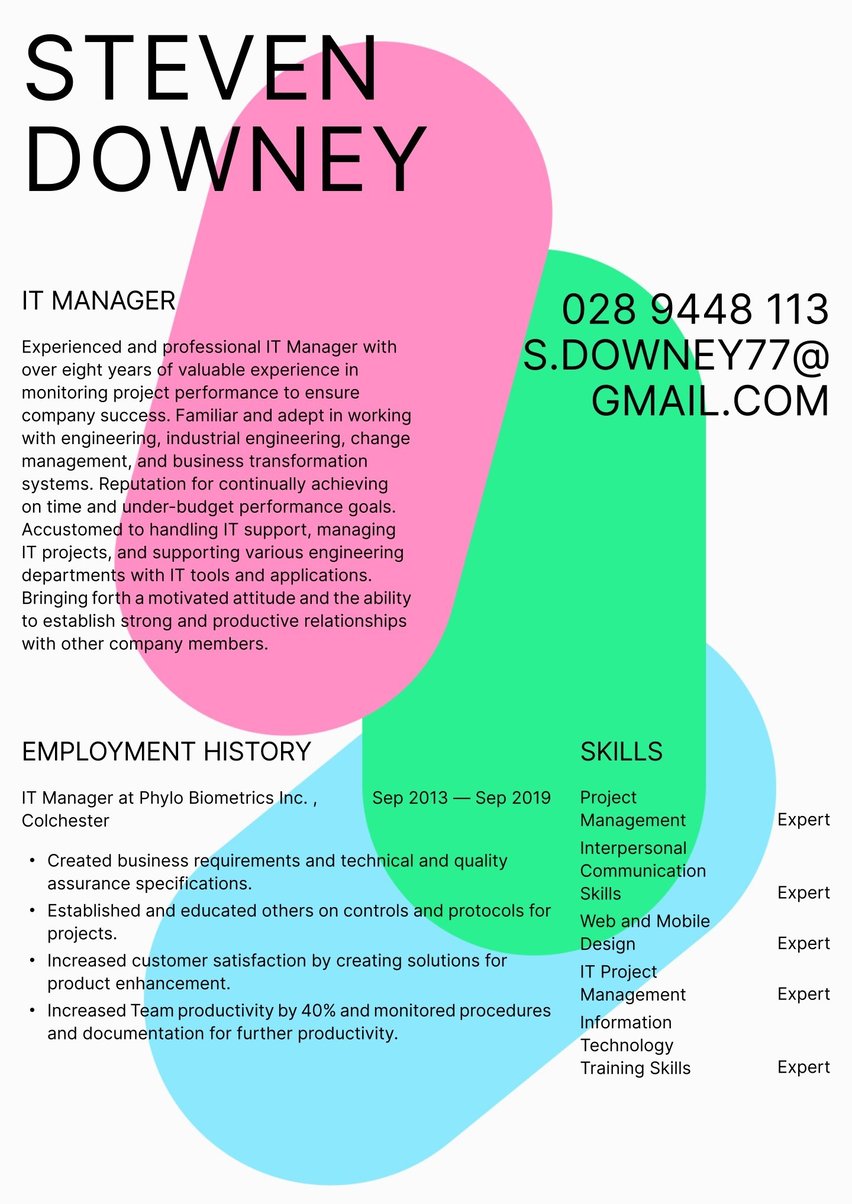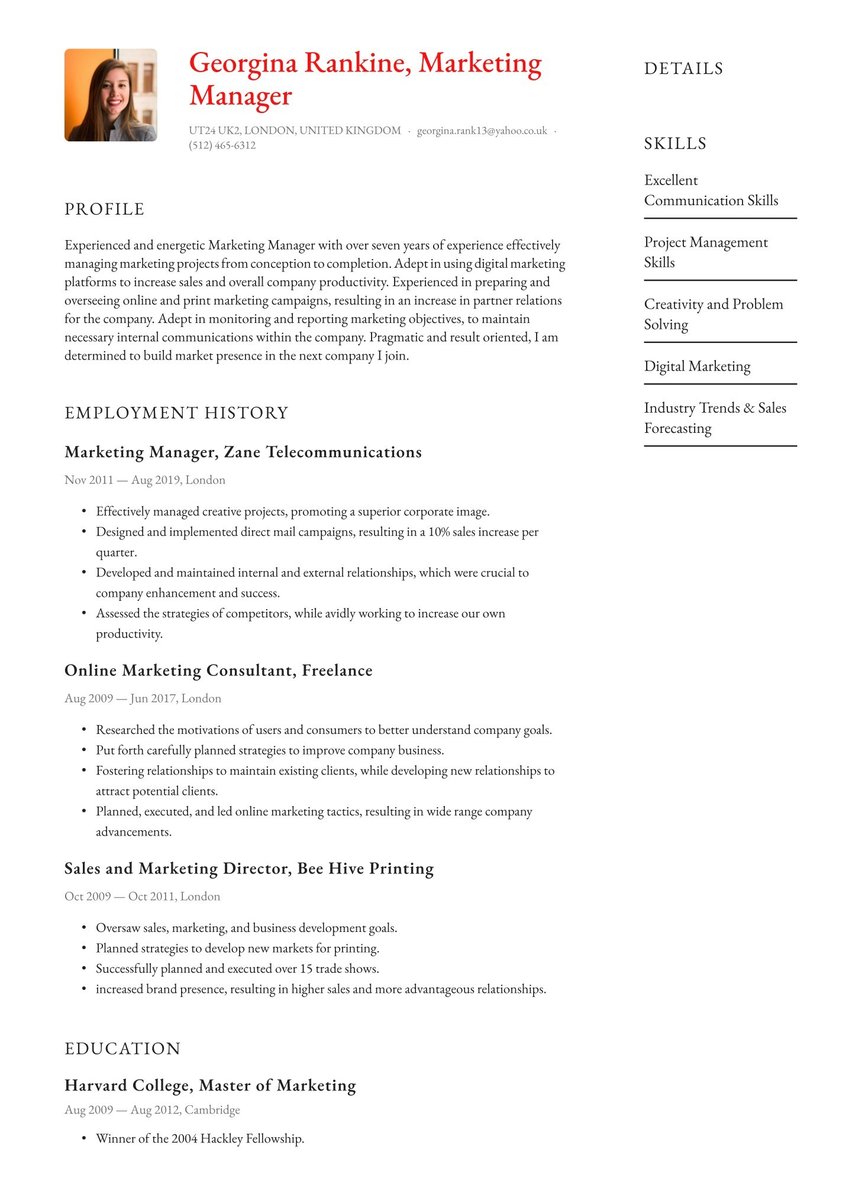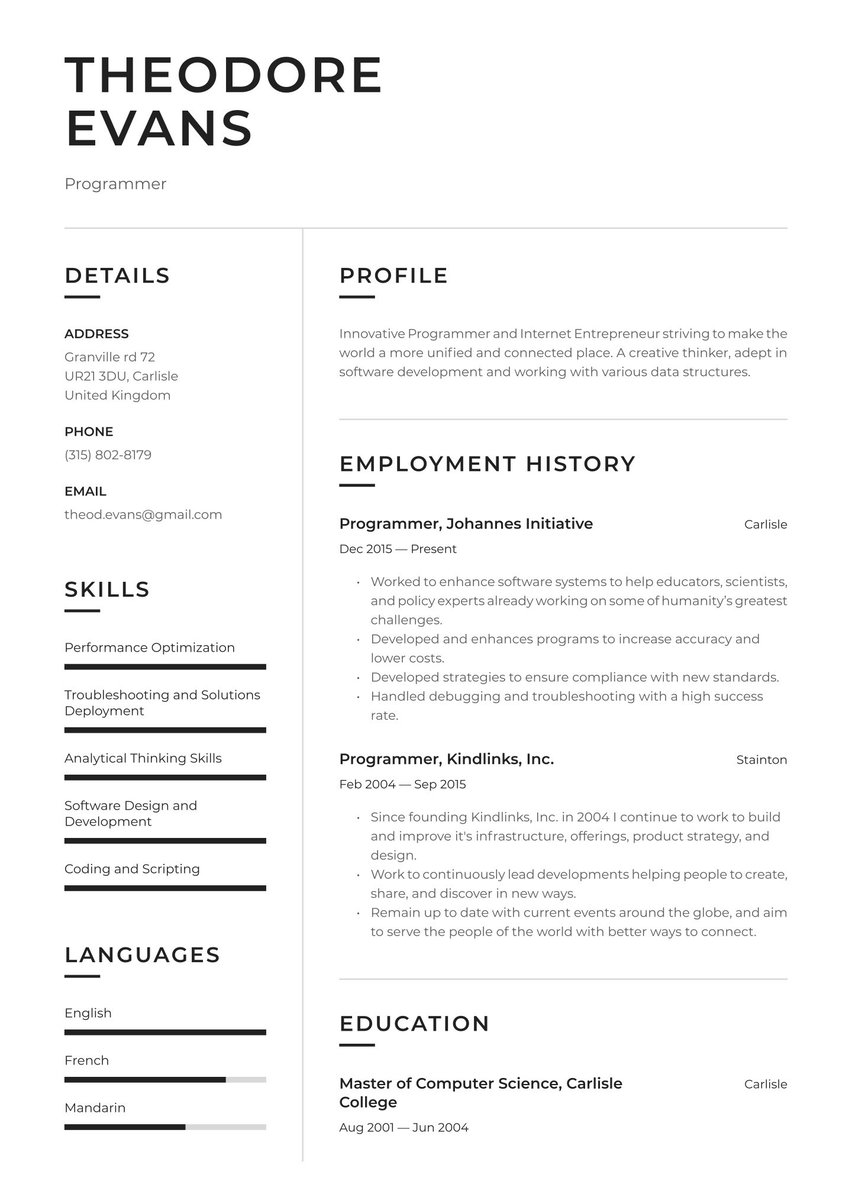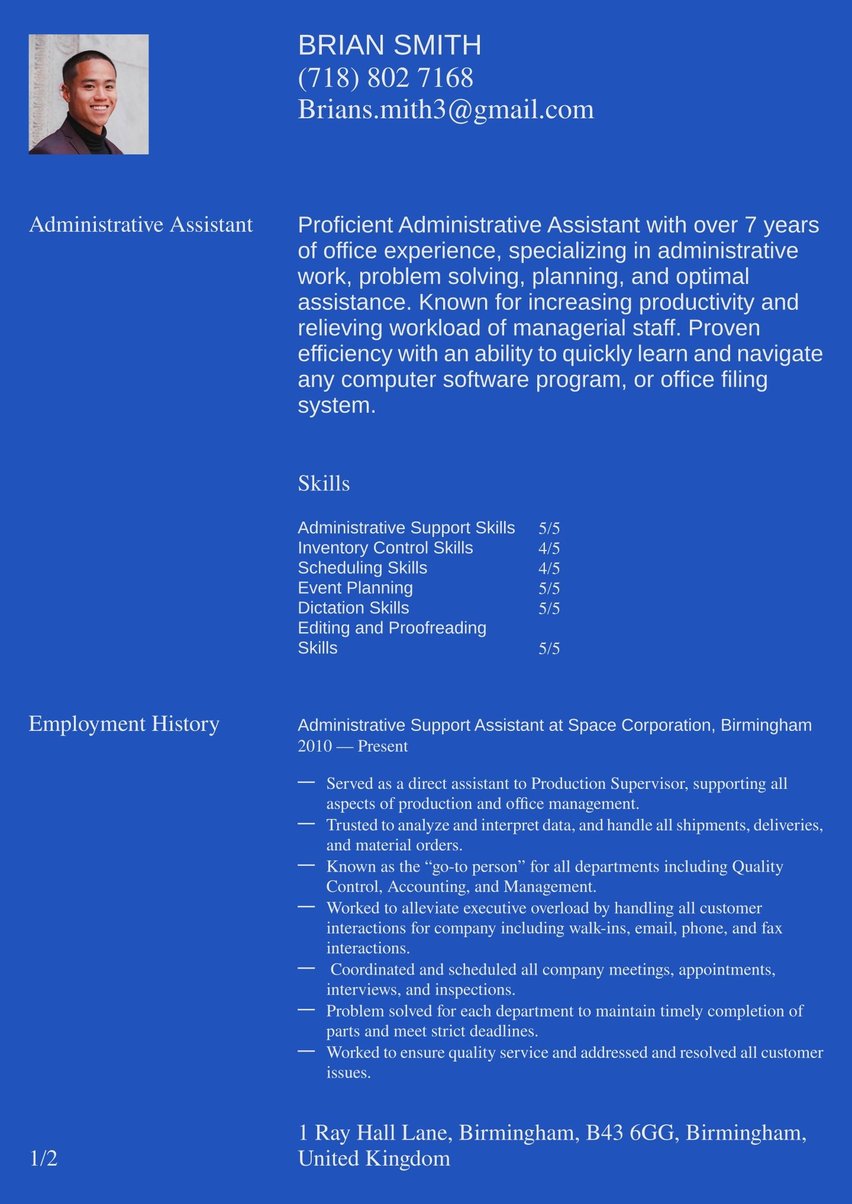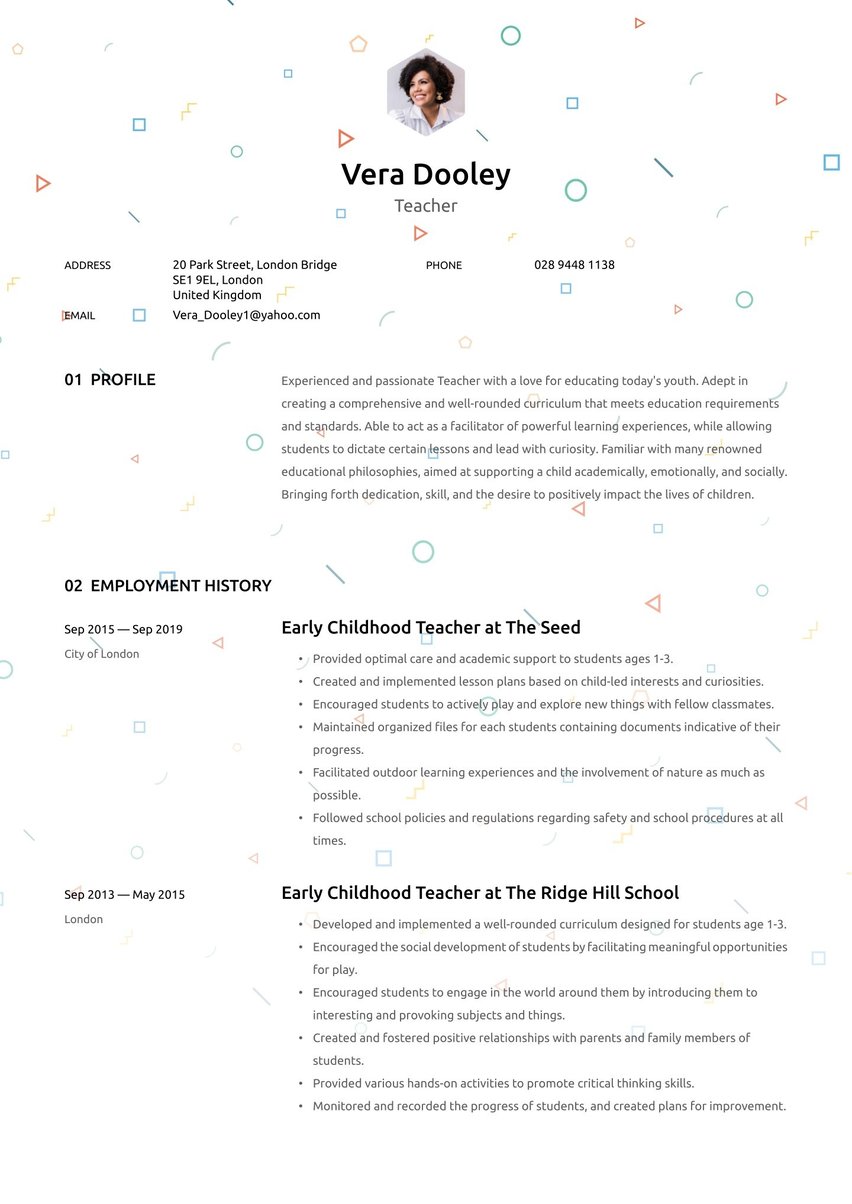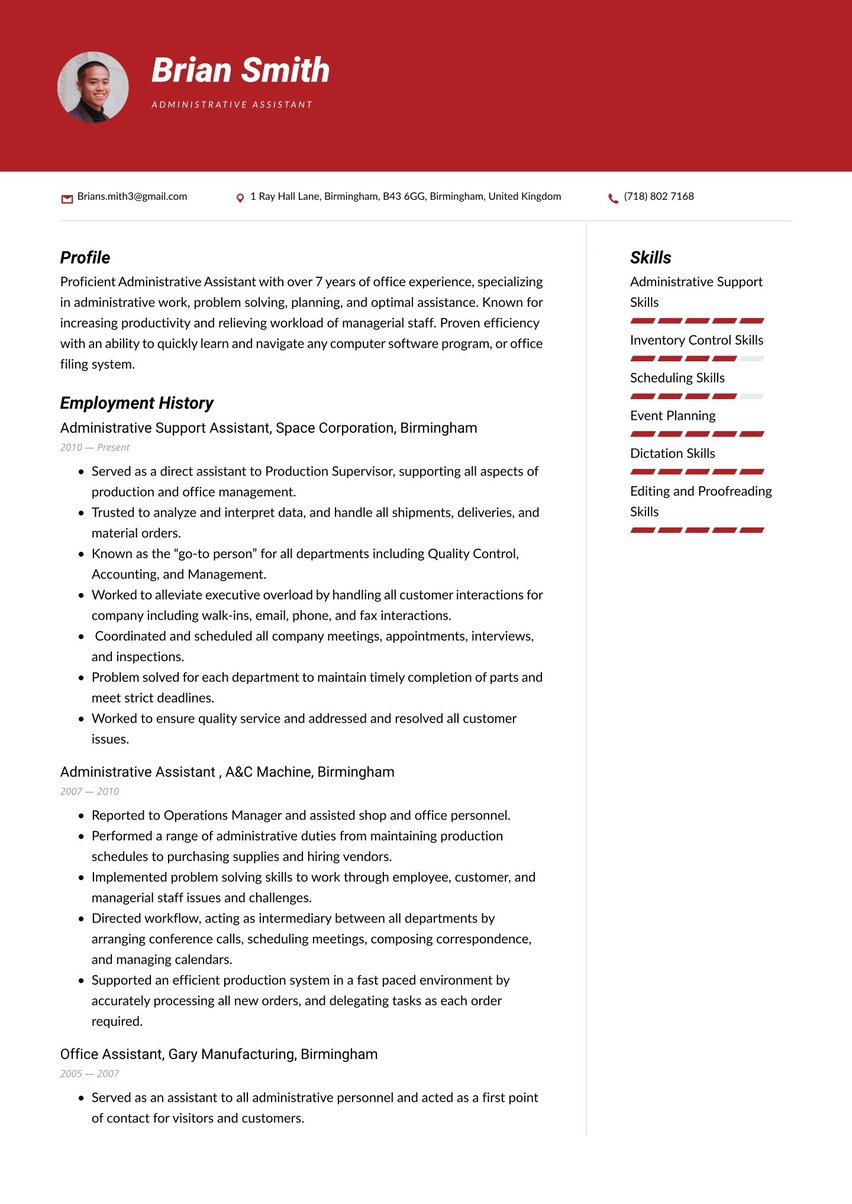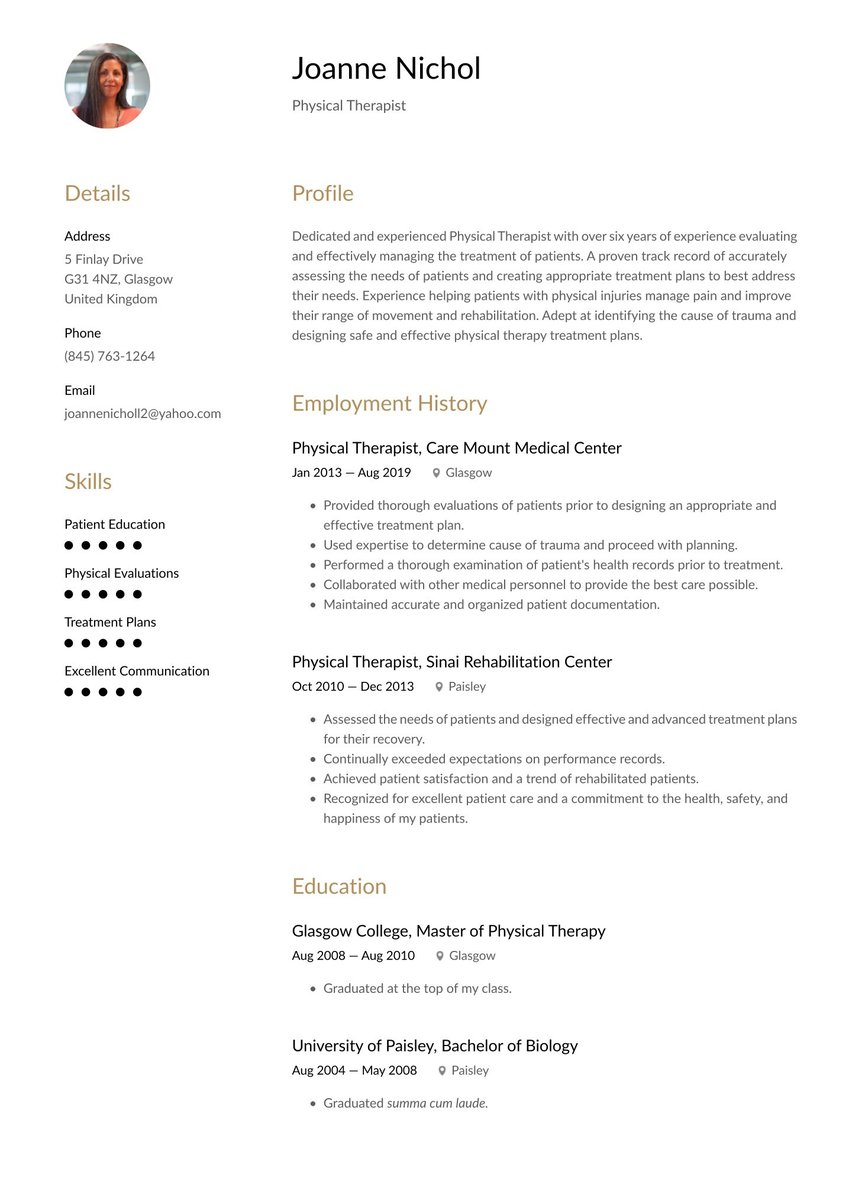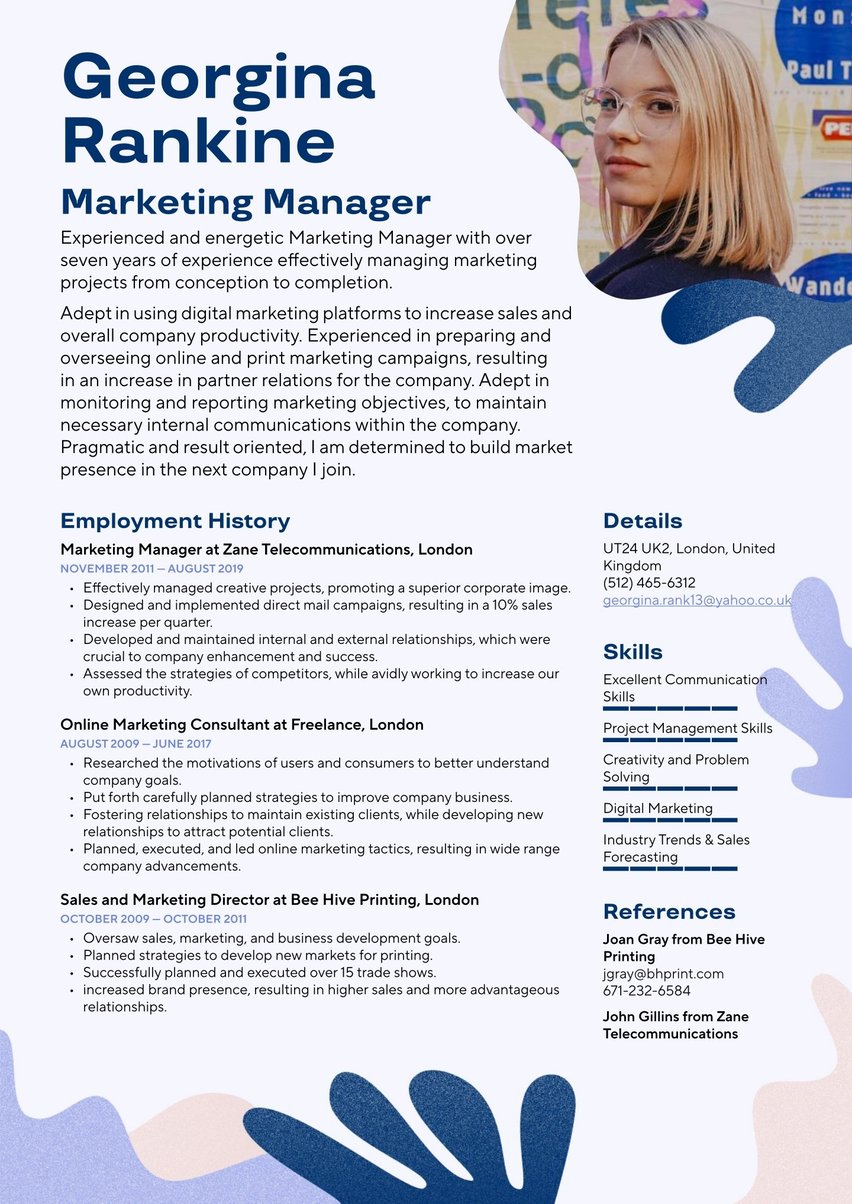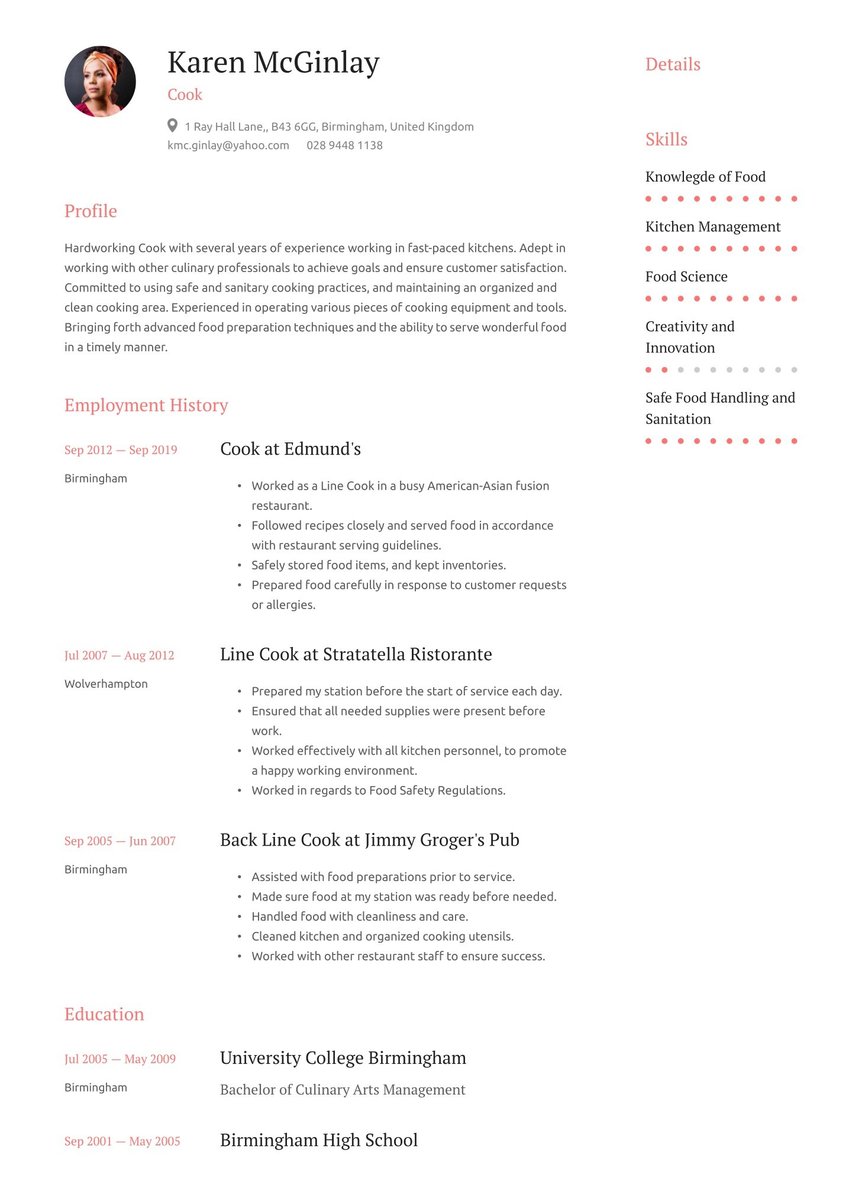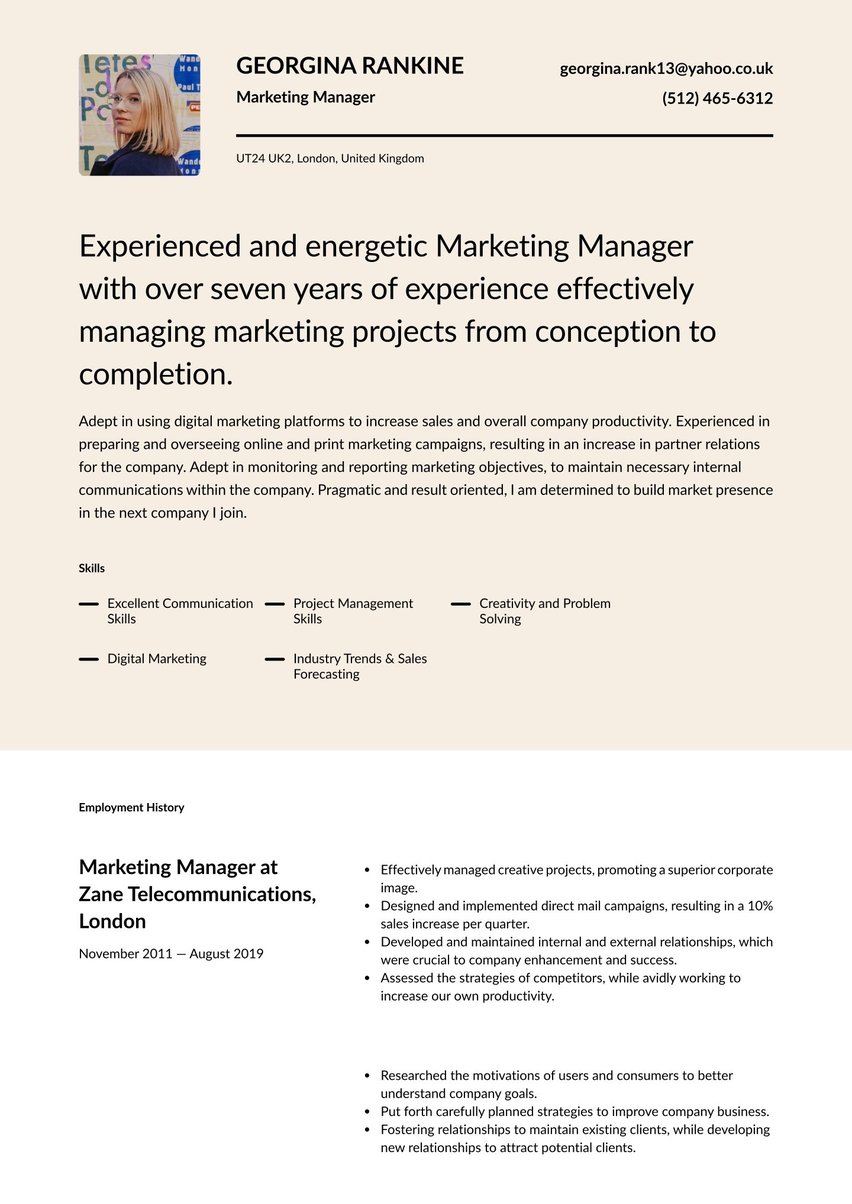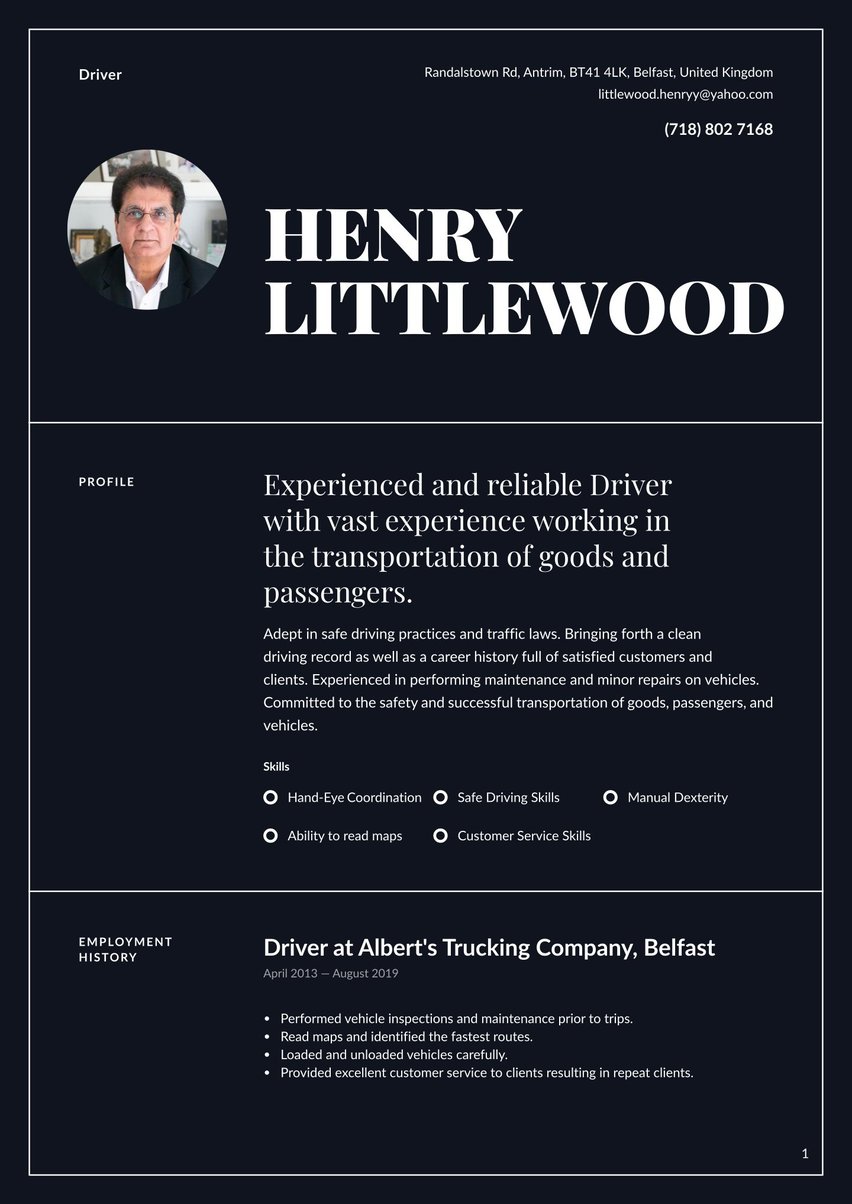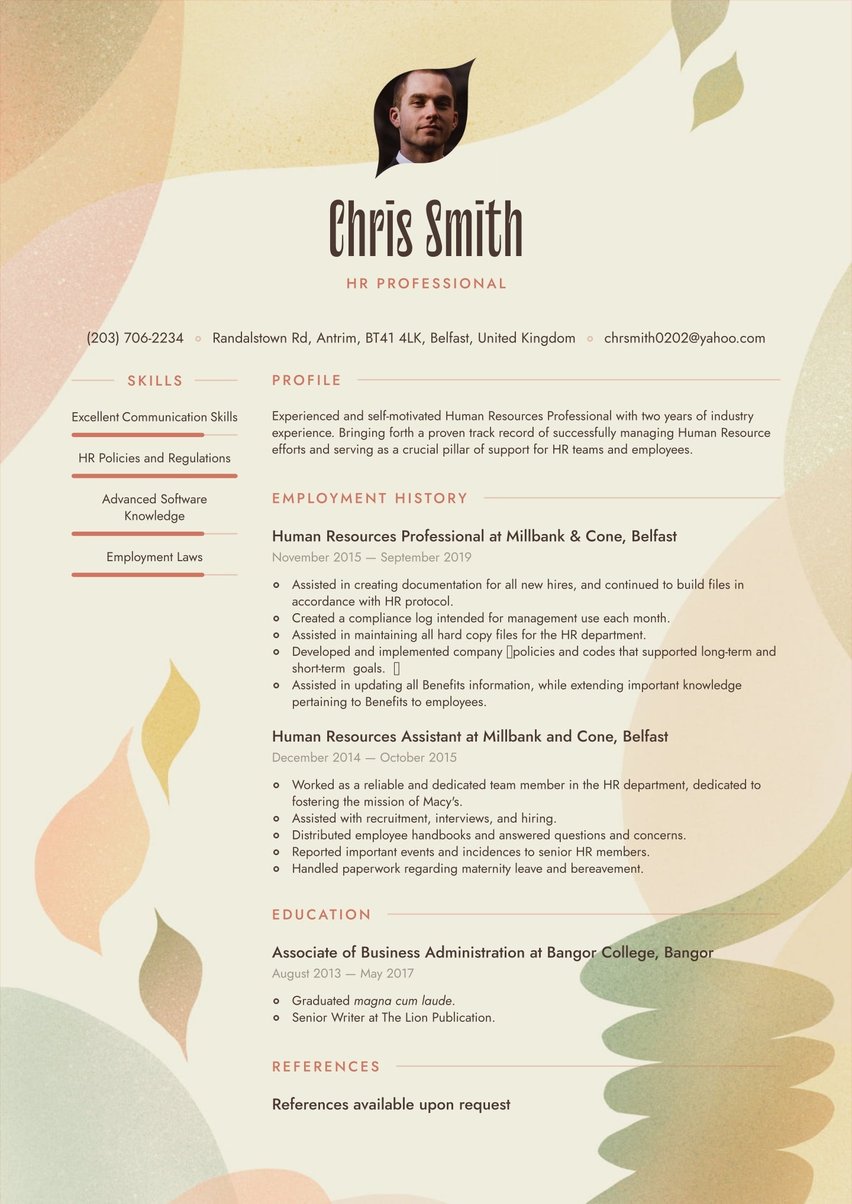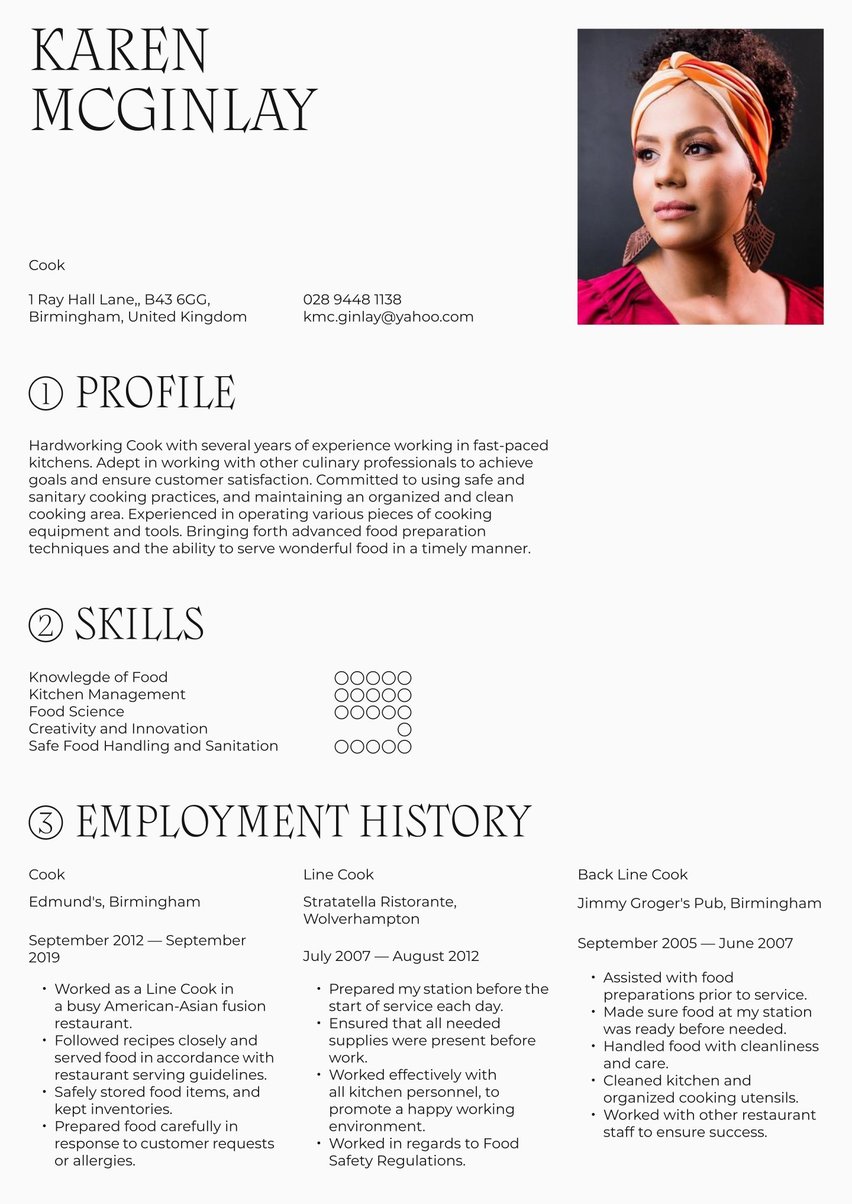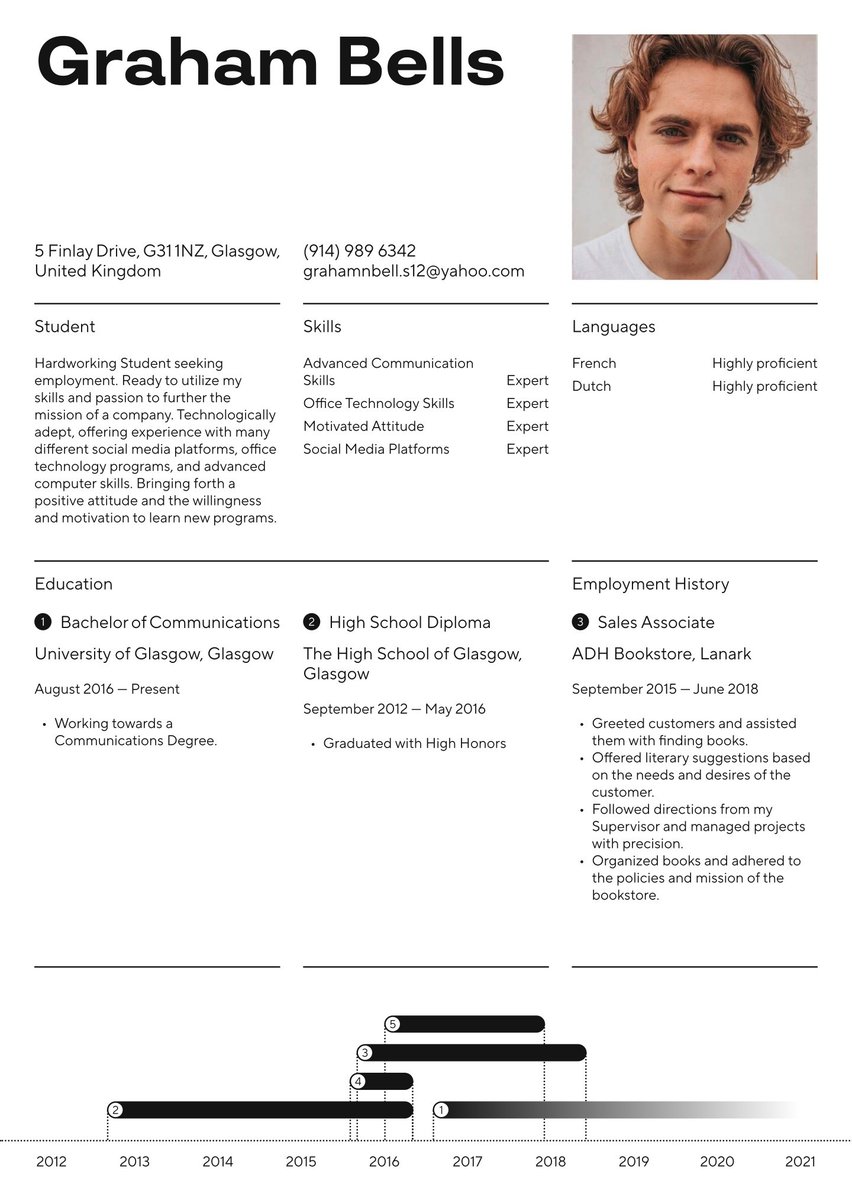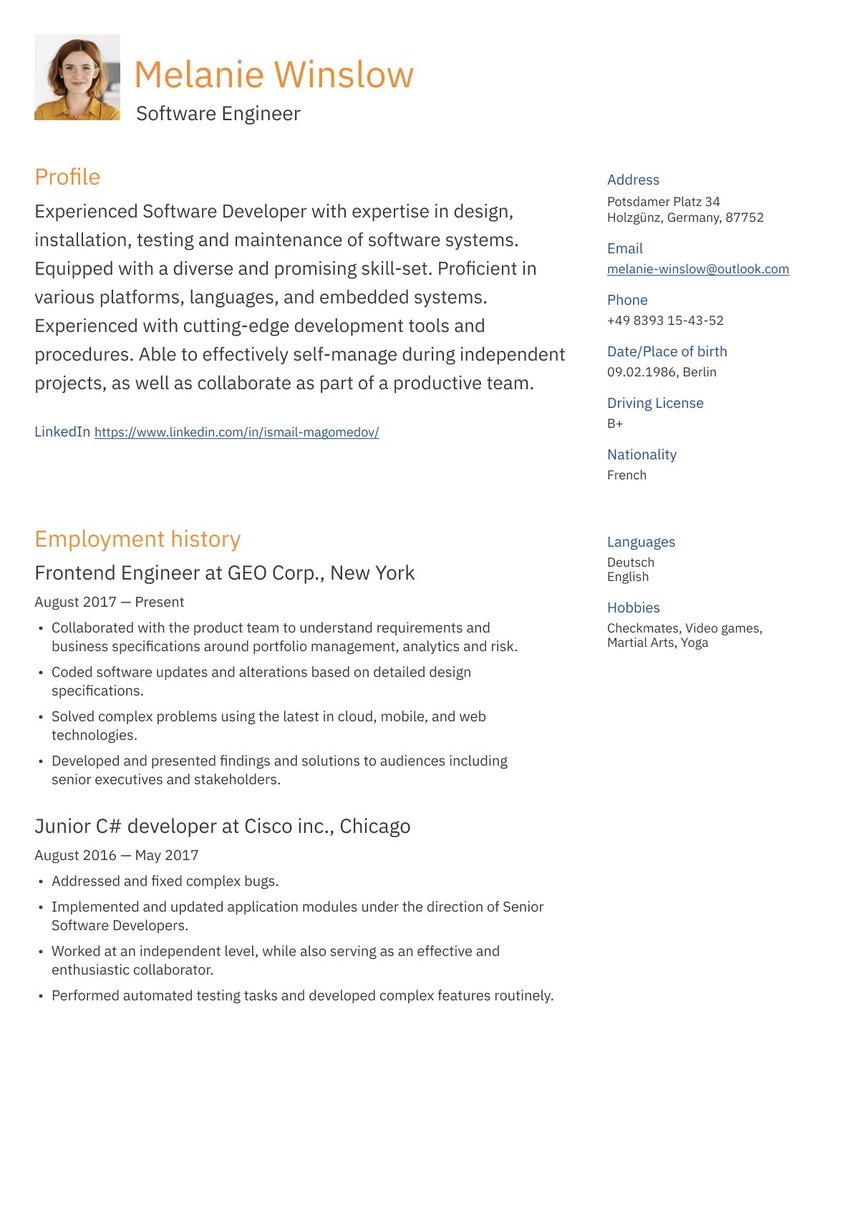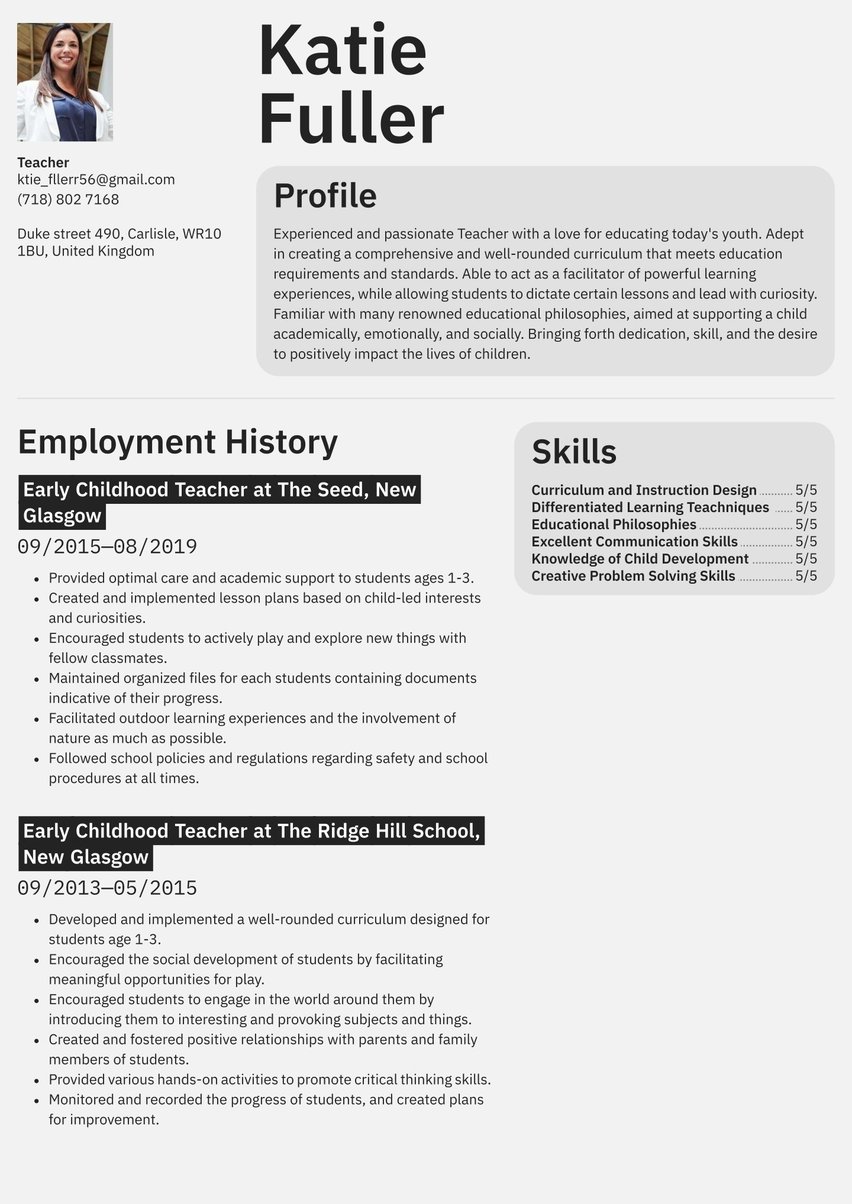Enthusiastic customer service agent with over four years’ experience in customer support by the phone, email, and through problem-solving scenarios. Known for friendly and patient communication style.
06/2020 - present, Customer Service Representative, Virgin Media, Southampton
- Act as phone, online chat, and email support for up to 50 customer contacts daily
- Respond to routine and complex product and billing queries with over 90% resolution rate
- Log in detail each customer interaction within proprietary CRM system
- Work to key performance indicators for call duration and customer satisfaction
03/2019 - 05/2020, Sales Associate, New Look, Edinburg
- Provided efficient service at tills serving on average 40 customers per shift
- Resolved shop floor customer enquiries relating to stock, payments, and returns
- Ran product promotions and advertised financial services to customers
01/2018 - 01/2021, BA in English literature & Customer Services, University of London, London
- Customer Support
- Phone & Email Communication
- Interpersonal Skills
- Multi-tasking
- Call Center Systems
- 01/2023, Call Center Customer Care Specialist Diploma,
- 01/2020, Customer Service Excellence Advanced Certificate,
As someone who speaks to people all day, your communicative prowess is unmatched. However, it probably doesn’t surprise you to learn that there are more ways to communicate than speaking on the phone. That’s exactly what you need to do — and do super well — with your call centre CV, in order to communicate to the hiring manager that you’re the person for the job.
But just how are you going to make that a reality?
To get the job you’ve got your heart set on, you need to master the art of speaking on behalf of yourself through your call centre CV. Remember, it all boils down to good communication. In this case, it’s just written. You can hit the ground running in your application process with a CV that embodies the skills you need to be a successful call centre agent.
If you’re ready to let your CV do the talking, we’ve got you covered.
CV guide for a call centre agent CV
Think of Resume.io as your call centre CV training manual. We’re brimming with hundreds of CV examples to help you on your way to crafting a call centre agent CV that will knock any hiring manager’s socks off. The final finessing is down to you with our easy-to-use CV builder.
This CV guide and corresponding call centre agent CV example will cover the following:
- How to write a call centre agent CV
- Choosing the right CV format for a call centre agent
- How to add your contact information
- Using summaries
- Adding your call centre agent experience
- Listing education and relevant experience
- Picking the right CV design/layout
- What the call centre agent market looks like and what salary you can expect
How to write a call centre agent CV
The very first step in writing your call centre CV is understanding what sections to include. Your CV should contain the following elements:
- CV header
- CV summary (aka profile or personal statement)
- Employment history section
- CV skills section
- Education section
There will be procedures that you need to follow as a call centre agent when going about your daily duties. The process of writing your CV is no different. The most important thing to bear in mind when you set about creating your CV content is that like no two callers are the same, no two companies are either. Do your research to make sure you are speaking their language and get your foot in the door of that interview room.
We’ve created some suggestions to kick off your writing process. Take a look at our recommendations and adjust your CV accordingly with the role you’re applying to in mind.
- Focus on results you’ve achieved as opposed to your responsibilities. Prospective employers will want to know what it is that you can bring to their call centre and what separates your voice from the many others answering trying to land this gig.
- Adapt your call centre CV for every new employer you decide to submit your CV to. This might sound like a lot of work but all you need to do is make the small necessary tweaks that will show that you’ve done your research about the company.
- Identify keywords in the job posting and use them throughout your call centre CV. This will ensure that your application makes it past the ATS screening software that many companies use.
- Opt for a professional CV template. Your job is about efficiency so you don’t need anything overly creative.
Optimise for the ATS
The Applicant Tracking System, also known as ATS, is a software that uses algorithms to scan CVs for keywords. CVs are then ranked according to their inclusion of those keywords.
If your CV does not rank highly enough against other applicants, your application gets filtered out before a human employer has even looked at it.
HR staff can be inundated with CVs so this software helps them save time by focusing on ones that demonstrate a candidate has made an effort from the beginning of the application process.
While it may seem unfair that your application getting read by an actual person rests on just a few keywords, it’s also a really easy fix. All you need to do is read through the job posting and identify the key terminology that has been included.
The next step is to make sure that vocabulary is present in your CV. Then you’ve beat the system and are onto the next phase of your application’s screening process.
Choosing the right CV format for a call centre agent
Your CV should reflect what you’ll be like on the phone, so endeavour to craft a CV that’s professional, clear and to the point.
For the majority of job seekers, the best format is reverse chronological. This positions your employment history as the most important section. As the name suggests, your previous experience should also be listed in reverse chronological order.
If you’d like to branch out and try something a little different, another alternative is the functional CV format. This format essentially enables you to draw a hiring manager’s attention to your important skills and competencies, as opposed to your employment history. If you’re new to the world of work, then this format could be one to consider.
Ultimately, the choice of CV template you make in our CV builder should be at your discretion. Remember to equip your carefully formatted call centre CV with a professional layout. After all, professionalism is a key quality of a successful call centre agent.
Include your contact information
You know better than anyone how important accessible contact information is. You’re also a pro on the other end of the phone. So don’t let your expertise go to waste and make sure that your CV header communicates exactly what a hiring manager needs to know in order to give you a call back.
Your contact information should be clear, easily accessible and most importantly, correct. Professional presentation is also a must. Follow these tips to avoid silly mistakes:
- Full name & title. List your first and last name. Also, include the title of the job that you are applying for.
- Professional email address. Avoid unprofessional email addresses that could make a bad first impression. Instead, opt for a clean format like firstname.lastname@gmail.com.
- Phone number. List a number where hiring managers are likely to get in touch with you easily. If you’re busy answering other phones, make sure you have a professional voicemail greeting.
- Location. Only include your city. Listing your address and postcode is now considered old-fashioned as well as unsafe. Add 'Willing to relocate' here if it’s applicable.
- LinkedIn. For something extra, you can list your LinkedIn profile. However, this should only be done if you’re an active user and it’s relevant.
Don’t include:
- Date of birth: This is not a requirement and if you do choose to include it you put yourself at risk of age discrimination.
- Personal details: Your marital status, social security number, passport number, etc. If it’s extremely personal information, it shouldn’t be on your CV.
Kerry Sanders
Call Centre Agent
07839998352
kerry.sanders@email.com
Kerry Sanders
Call Centre Rockstar
07839998352
callmekerry@email.com
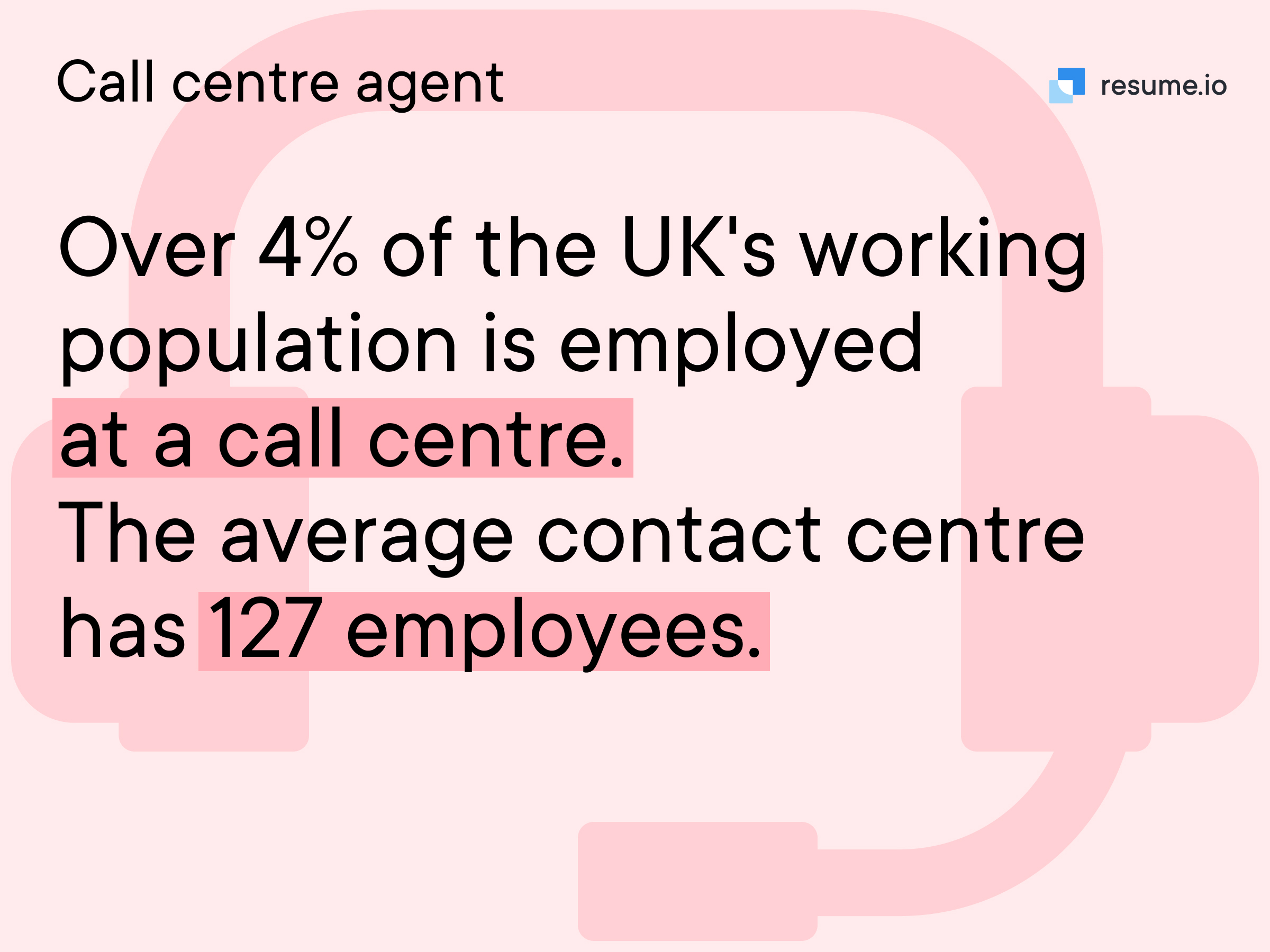
Make use of a summary
Your CV summary is essentially a synopsis of the need-to-know information about you as a professional. You wouldn’t start an over-the-phone sales pitch with every detail of the product, would you? Your CV summary is the catchy two to three sentences that draw in the reader’s attention.
So, use your summary to grab the hiring manager’s attention so that they’re more likely to read on. Three sentences aren’t very long. So make every word count. You can do this through action verbs in either the present or past simple form. These should always be tailored to your profession. For a call centre agent, these could include verbs like “resolved”, “handled”, or “managed”.
In short, your call centre CV summary should give a hiring manager a clear idea of why they should call you in for an interview. This shouldn’t take them more than a few seconds to understand, so prioritise those buzzwords and overall clarity when writing.
It’s also the perfect spot to highlight any achievements that make your application stand out – so long as they’re relevant, of course. Detail them here with a snappy, concise approach to your writing to utilise space in your summary most efficiently.
Don’t worry if this feels like a lot of information to wrap your head around. We’ve taken everything into account that you may need and have some related CVs you can take a look at for ideas. For instance, there’s our:
You can also find several adaptable call centre CV examples summary below:
Motivated call centre agent with experience in a fast-paced call centre. Consistently received positive customer feedback. Excellent communication and problem-solving skills. Confident in adapting scripted pitches to suit the language of the call recipient.
Experienced call centre agent with a proven track record at resolving customer issues, boasting a 95% customer satisfaction rate. Strong verbal and written communication skills and adept at working in fast-paced environments. Professional and friendly manner.
Call centre agent with 10+ years consistently exceeding sales targets. Solution-driven mindset and extensive experience working in fast-paced call centres while maintaining a professional manner when addressing potential customers.
Outline your call centre agent work experience
To outline your work experience, use the reverse chronological format. This means listing your most recent job at the top of the section and then working your way back. If you boast multiple decades of professional history, you don’t need to go back more than 10-15 years.
For each role you have worked in, remember to create a subheading including:
- Your job title
- The name of the company you worked for
- Your dates of employment
- The location of the position
When describing your responsibilities and how you contributed to your previous workplaces, think about how to best use your CV's limited space. Detail everything in brief bullet point statements underneath the corresponding subheading. Omit “I” and focus instead on dynamic action verbs that can help get your point across quickly and concisely.
Remember that specificity is key. Every word you use to describe yourself in your call centre CV has to communicate both why you’re suited for the role you’re applying to and also how you could make a positive difference to a company where other applicants couldn’t.
Achieving this balance in your work experience section means focusing on your accomplishments and results. Think about processes you’ve improved and your sales records or customer satisfaction ratings. These are qualities that you could bring over to other call centres. Moreover, they show your investment in your career and professional development.
Employers will not only take an interest in applicants who have gone above and beyond, but they are also more likely to put their trust in them as the voice of their company. So, think about what it is that you have achieved so far in your career, no matter how small you may consider that achievement to be. Now make sure you find it a place in your work experience content.
For more ideas on how your call centre agent employment history section should shape up, take a look at the CV sample content below:
Customer Service Representative at Virgin Media, Southampton
June 2020 - Present
- Act as phone, online chat, and email support for up to 50 customer contacts daily
- Respond to routine and complex product and billing queries with over 90% resolution rate
- Log in detail each customer interaction within proprietary CRM system
- Work to key performance indicators for call duration and customer satisfaction
Sales Associate at New Look, Edinburg
March 2019 - May 2020
- Provided efficient service at tills serving on average 40 customers per shift
- Resolved shop floor customer enquiries relating to stock, payments, and returns
- Ran product promotions and advertised financial services to customers
Include the relevant key skills that make you a great call centre agent
Your skills section is your opportunity to show off the competencies you have or have acquired along the way in your career. It should be a combination of both hard and soft skills. Regarding hard skills, that could include any training you have completed.
Soft skills for a call centre agent are extremely important. Consider writing about one or more of the following:
- Problem solving. In a customer service-related call centre job your ability to help customers to solve their issue while maintaining a positive attitude is vital.
- Patience. When making dozens of calls a day, the only skill that needs to rival your efficiency is your patience.
- Adaptability. Whatever the nature of the calls you make, you’ll need to adapt your style of speaking and approaching the task to a range of personalities.
Don’t think about your skills list as something extra to throw in about yourself. Every part of your CV plays a role in crafting an idea of you as a professional for hiring managers. It’s important that you give as much time and thought to this section as you would any other part.
A lack of effort will be as evident as not including it in the first place, and if you’re not invested in your call centre’s CV content, why should a hiring manager be?
How you write your skills is also just as important as the skills themselves. Prioritise skills that hit the keywords from the job listing first, and follow them with other relevant ones that will help move your application into the interview pile.
Don’t worry if you’re still stuck on the perfect way to write them. Our CV builder has several pre-written key skills you can choose from and then add to with your own ideas to get you started.
Take a look at what the skills box looks like in our call centre agent template.
Key Skills and Proficiencies
Detail your education & relevant call centre agent certifications
Your education section is arguably the easiest part of writing your CV as a call centre agent. No formal qualifications are required for this job role. However, employers may still ask for GCSEs or an equivalent. All you need to do in this case is list those qualifications in reverse chronological order.
Remember when listing them to include a subheading for each qualification. This is followed by the qualification name, the institution you studied it at, your dates of attendance and the location. If you do have any higher or further education, you could choose not to include your GCSEs to save space.
However, not everyone went to university. So consider some of the following qualifications that you might have earned at school or college as options to list on your CV. Only if you actually have them, of course!
- GCSEs
- BTECs
- A levels
- National certificates or diplomas
Working on your professional development
While no formal qualifications are required to pursue a career in a call centre, there are still plenty of opportunities to further your understanding of the field and add to your skills.
Signing up as a member of either the Institute of Customer Service or the Call Centre Management Association would give you access to training courses and seminars and even give you the opportunity to network.
Invest in yourself and impress hiring managers with your passion for your professional growth. You never know, this could also be a great way to open up a discussion about how else they can help you continue to do that in their company in an interview.
Alongside formal education, don’t be shy about utilising this section to list any other certifications or training you have completed as a call centre agent. If you’re more education-heavy and lack experience, you could consider changing up the order of your CV content and placing this section before your employment history.
This approach is called a functional CV and would draw an employer’s attention to what you could bring to the table and your potential and enthusiasm as a candidate. Experience isn’t always everything, and if it’s something you’re short on, balance it with what else you have.
To make sure you’re on the right track, have a look at the CV sample content below.
BA in English literature & Customer Services, University of London, London
2018 - 2021
Pick the right CV layout and design for a call centre agent's CV
A call centre CV layout and design is like that professional, patient tone of voice you use with customers to put them at ease. Change your tone even a little, and risk changing their impression of you. Apply this same mentality to the visuals of your CV and think about what you want your layout and design to communicate.
Your call centre CV's design overall shouldn’t be too loud. This isn’t how you get the attention of a call centre hiring manager. They’re going to be on the lookout for something professional and reader-friendly. If there’s too much going on, it could give the impression that you’ve prioritised appearance over communication, which won’t earn you any points in this profession.
We recommend limiting colour and opting for a simple font that communicates that your character and values align with the utmost professionalism. Only throw colourful design elements into the mix if you’ve done your research thoroughly and think that would work for a particular call centre. There’s also no reason why you can’t have multiple versions of your CV with different designs – you’re just dressing it to impress.
Want some ideas on what that could look like? We’ve got plenty of professionally designed, field-tested CV templates to make sure you’re spending more time applying to roles you want and less time designing.
Call centre agent text-only CV example
Profile
Enthusiastic customer service agent with over four years’ experience in customer support by the phone, email, and through problem-solving scenarios. Known for friendly and patient communication style.
Employment history
Customer Service Representative at Virgin Media, Southampton
June 2020 - Present
- Act as phone, online chat, and email support for up to 50 customer contacts daily
- Respond to routine and complex product and billing queries with over 90% resolution rate
- Log in detail each customer interaction within proprietary CRM system
- Work to key performance indicators for call duration and customer satisfaction
Sales Associate at New Look, Edinburg
March 2019 - May 2020
- Provided efficient service at tills serving on average 40 customers per shift
- Resolved shop floor customer enquiries relating to stock, payments, and returns
- Ran product promotions and advertised financial services to customers
Education
BA in English literature & Customer Services, University of London, London
2018 - 2021
Skills
- Customer Support
- Phone & Email Communication
- Interpersonal Skills
- Multi-tasking
- Call Center Systems
Call centre agent job market and outlook
While you may not see it on a visual level, call centre agents play a key role in presenting a company’s image. How they handle inquiries and deal with customers can ultimately make or break a company’s reputation and have a knock-on effect on repeat business.
There were approximately 109,000 individuals employed in call and contact centre occupations in the UK in 2019. Temp work is generally a useful way into this industry.
That’s because some call centres may need to reduce or increase the size of their teams throughout the year depending on the influx of calls they expect to receive.
Once you’ve gained enough experience this can eventually lead to permanent positions, or even a position as a team leader.
What type of salary you can expect as a call centre agent
If working standard full-time hours of 38-40 a week, a call centre agent can expect to earn anywhere from £15,000 to £28,000 a year in the UK.
Your salary will most likely reflect your experience in the industry, with £15,000 being what you should expect if it’s your first professional role in this field.
Key takeaways for building a call centre agent CV
- While no specific qualifications are required to become a call centre agent, there’s plenty of room for professional development. So, shine a light on any relevant training you’ve undertaken.
- Apply your excellent communication skills to every part of your CV; from your CV design to your CV’s skills section.
- Include keywords from the job description to make sure your application makes it past the ATS software and shows your prospective employer that you mean business.
- When you’re stuck for ideas, don’t be afraid to use a CV template so that you can dress to impress without losing time on fiddly designs and formatting.

